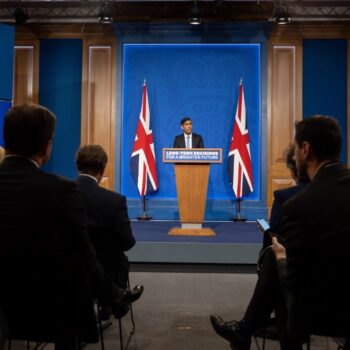On Fuel Poverty Awareness Day, E3G [1] and National Energy Action (NEA) [2] reveal there were over 17,000 deaths due to cold housing conditions last winter and almost twice as many people died compared to the previous winter [3]. E3G and NEA also confirm last winter’s excess winter mortality in the UK was the highest since 1976. The new findings are released on national Fuel Poverty Awareness Day [4], the national day highlighting the problems faced by those struggling to keep warm in their homes.
Pedro Guertler, Energy Efficiency Programme Leader at E3G comments:
“The UK has one of the worst records on cold homes-related deaths in Europe [5]. This epidemic is entirely preventable and E3G and NEA are calling on the UK Government in its upcoming Spending Review to reinstate public capital investment in home energy efficiency to fix the cold homes crisis.
“The fact that UK homes are amongst the least energy efficient in Western Europe [6] confirms that ill health effects and deaths attributed to cold housing are entirely preventable. However, the Committee on Climate Change reports that the rate at which homes are being insulated has collapsed by 95% since 2012 [7]. At the same time, energy price rises [8] will make it harder for many people, especially those on fixed incomes, to keep their homes adequately warm.”
Adam Scorer, Chief Executive of NEA comments:
“Everybody has the right to live in a warm and safe home but tragically, many people died needlessly last winter because of cold homes. Living in a cold damp home can also lead to extremely poor health, especially in those who are vulnerable such as young children, older people, and those with long term sickness and disabilities [9]. With fuel bills set to rise again, without urgent local and national action we are worried the same will keep happening each winter”.
ENDS
Notes to Editors
For further information on the detail of this release contact Peter Smith (peter.smith@nea.org.uk; 07595 780 893) or Pedro Guertler (pedro.guertler@e3g.org; 07867 314 004).
[1] E3G is an independent climate change think tank operating to accelerate the global transition to sustainable development. E3G builds cross-sectoral coalitions to achieve carefully defined outcomes, chosen for their capacity to leverage change. E3G works closely with like-minded partners in government, politics, business, civil society, science, the media, public interest foundations and elsewhere. In 2018, E3G was ranked the fifth most influential environmental think tank in the world, third in Europe and first in the UK by the Go to Think Tank Index. More information is available at www.e3g.org [2] National Energy Action (NEA) is the UK fuel poverty charity which undertakes research, advocacy and works collaboratively with partners from local and national governments, industry and the third sector to deliver practical solutions to vulnerable people living in cold homes across the UK. For more information visit: www.nea.org.uk [3] Set out in Table 1, taken from report. Living in the poorest quality housing causes places health at risk and leads to premature death. In 2017/18 there were 56,300 excess winter deaths in the UK, the highest number since 1975/76. 16,890 of these deaths were attributable to cold homes. Ill health caused by poor housing is an even bigger problem. Treating the health impacts of cold homes, including cardiovascular and respiratory diseases, falls and injuries and mental ill health, is costing the NHS an estimated £1.36 billion each year.Table 1: Excess winter deaths considered attributable to cold housing conditions
Table 2: Excess winter mortality index for 30 European countries, 1980-2013

In warmer countries, the cold-related health risks people face are much more confined to the months in which excess winter mortality is measured: December through to March. In colder countries, the period of vulnerability to cold is longer. This means that cold-related mortality in colder countries can be severely underestimated. To make the impact of cold conditions on mortality more comparable across all 30 European countries examined, Liddell et al. propose an alternative measure which takes account of the length and depth of time homes need to be heated to be safely warm in each country, as measured by ‘heating degree days’ (HDDs), shown in Table 3.
Table 3: Ranking of 30 European countries’ ratio of EWM index to IHDD (Liddell et al., 2016)

Guertler, P., Carrington, J. & Jansz, A. (2015) The Cold Man of Europe – 2015
Guertler, P. & Royston, S. (2013) Fact-file: The Cold Man of Europe
[7] Committee on Climate Change (2018) Reducing UK emissions: 2018 Progress Report to Parliament [8] Typical annual household energy bills will rise from £1,137 to £1,254, in line with Ofgem’s energy price cap being reviewed upwards this April. See [9] Cold housing conditions – usually the result of people having a low income and living in an energy inefficient home – can cause or exacerbate respiratory and cardiovascular conditions, and increase the probability of trips and potentially fatal falls. Cold homes are known to be detrimental to mental health and can lead to social isolation. [10] There is cross party consensus on the need for investment in energy efficiency and this provides strong returns of £3-4 pay-back for every £1 invested, alongside harnessing wider substantial macro benefits to UK PLC. The National Infrastructure Commission, Committee on Fuel Poverty (CFP), and many other organisations are calling on the UK Government to ensure energy efficiency becomes a national infrastructure priority and introduce a compressive building retrofit scheme which would include a new Clean Growth Fuel Poverty Challenge Fund providing necessary central investment to meet the near-term fuel poverty milestones. The Committee on Fuel Poverty have also identified a £1bn gap to meet 2020 Band E milestone and £3bn to meet 2025 fuel poverty targets.

